英语作文(蹇子骥)
千里骐骥寻伯乐高山流水觅知音作文
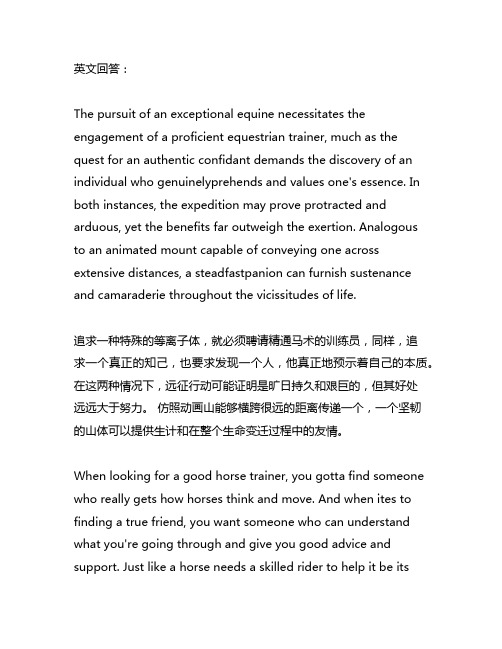
英文回答:The pursuit of an exceptional equine necessitates the engagement of a proficient equestrian trainer, much as the quest for an authentic confidant demands the discovery of an individual who genuinelyprehends and values one's essence. In both instances, the expedition may prove protracted and arduous, yet the benefits far outweigh the exertion. Analogousto an animated mount capable of conveying one across extensive distances, a steadfastpanion can furnish sustenance and camaraderie throughout the vicissitudes of life.追求一种特殊的等离子体,就必须聘请精通马术的训练员,同样,追求一个真正的知己,也要求发现一个人,他真正地预示着自己的本质。
在这两种情况下,远征行动可能证明是旷日持久和艰巨的,但其好处远远大于努力。
仿照动画山能够横跨很远的距离传递一个,一个坚韧的山体可以提供生计和在整个生命变迁过程中的友情。
When looking for a good horse trainer, you gotta find someone who really gets how horses think and move. And when ites to finding a true friend, you want someone who can understand what you're going through and give you good advice and support. Just like a horse needs a skilled rider to help it be itsbest, we all need a caring and understanding friend to help us through life's ups and downs.在寻找一个好马教练时,你必须找到一个真正懂得马的思考和动作的人。
以诫子书为话题写作文
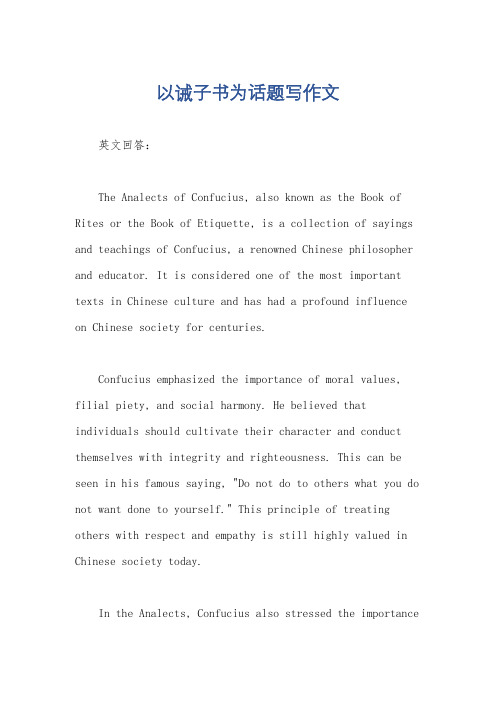
以诫子书为话题写作文英文回答:The Analects of Confucius, also known as the Book of Rites or the Book of Etiquette, is a collection of sayings and teachings of Confucius, a renowned Chinese philosopher and educator. It is considered one of the most important texts in Chinese culture and has had a profound influence on Chinese society for centuries.Confucius emphasized the importance of moral values, filial piety, and social harmony. He believed that individuals should cultivate their character and conduct themselves with integrity and righteousness. This can be seen in his famous saying, "Do not do to others what you do not want done to yourself." This principle of treating others with respect and empathy is still highly valued in Chinese society today.In the Analects, Confucius also stressed the importanceof education and self-improvement. He believed that knowledge and learning were essential for personal growth and societal progress. Confucius encouraged his disciples to continuously seek knowledge and to strive for self-improvement. This emphasis on education has had a lasting impact on Chinese culture, where education is highly valued and seen as a means to achieve success and social mobility.Furthermore, Confucius advocated for the importance of social relationships and the proper conduct in different roles and positions. He emphasized the importance of maintaining harmonious relationships within the family, between friends, and in society as a whole. Confucius believed that by fulfilling one's responsibilities and obligations in these relationships, individuals could contribute to a harmonious and stable society.中文回答:《论语》是孔子的一部经典著作,也被称为《礼记》或《仪礼》。
纪渻子养斗鸡的启示英语作文

纪渻子养斗鸡的启示英语作文In the annals of Chinese literature, the parable of Ji Guangzi and his fighting cockerel stands as a timeless allegory, echoing through the centuries with its profound insights into human nature, the nature of competition, and the path to true success.Ji Guangzi, a renowned scholar and philosopher of the Warring States period (475-221 BC), was known for his eccentric ways and unconventional teachings. One day, while strolling through the marketplace, he stumbled upon a young man engaged in a heated argument over a fighting cockerel. The young man was adamant that his bird was invincible, having bested all other challengers in the area. Intrigued, Ji Guangzi approached the young man and inquired about his methods for training such a remarkable creature.The young man proudly explained his rigorous regimen of intense physical conditioning and a specialized diet. He boasted of his secret techniques for sharpening thecockerel's claws and beak. Ji Guangzi listened attentively, his keen eye observing the young man's every move. When the young man had finished his exposition, Ji Guangzi chuckled softly and said, "Young man, you have indeed put mucheffort into preparing your cockerel for battle. But tell me, have you given any thought to the nature of the opponent it will face?"The young man looked at Ji Guangzi in confusion. "What does that matter?" he asked. "My cockerel is the strongestin the area. No opponent can match its prowess."Ji Guangzi shook his head and replied, "You are mistaken, young man. The true nature of an opponent liesnot solely in its physical attributes or combat skills. It lies in its motivations, its desires, and its fears. Ifyour cockerel is driven solely by the instinct to fight, then it will be easy for a more cunning opponent to exploit its weaknesses."The young man scoffed at Ji Guangzi's words. "Cunning? What use is cunning in a battle of strength?"Ji Guangzi smiled patiently and said, "Cunning, young man, is the art of deception. It is the ability to outthink your opponent, to anticipate their moves, and to exploit their weaknesses. A cockerel that relies solely on brute force may be formidable against opponents of equal strength. But when faced with an opponent that is more cunning, itwill be easily defeated."The young man remained unconvinced, but Ji Guangzi's words planted a seed of doubt in his mind. He decided toput Ji Guangzi's theory to the test. He arranged a match between his cockerel and a smaller, less muscular opponent. To his astonishment, the smaller cockerel employed a series of cunning tactics, feinting and dodging, to wear down his larger opponent. In the end, the smaller cockerel emerged victorious.The young man was humbled by the experience. Herealized that Ji Guangzi was right. True success in competition required more than just physical strength or technical skill. It required a deep understanding of one'sopponent and the ability to adapt one's strategy accordingly.The parable of Ji Guangzi and his fighting cockerel is not merely a story about cockfighting. It is a timeless allegory about the nature of competition and the path to true success. In any endeavor, whether it be in business, politics, or personal relationships, true success is achieved not through brute force or cunning alone, but through a combination of both. It requires a deep understanding of one's opponent, the ability to adapt one's strategy, and the wisdom to know when to fight and when to retreat.Just as Ji Guangzi's fighting cockerel was defeated by a smaller, more cunning opponent, so too can our own ambitions be thwarted by those who are more adaptable and more strategic. True success lies not in crushing our opponents, but in outthinking them, anticipating their moves, and exploiting their weaknesses. It lies in understanding the nature of competition and in embracing the principles of adaptability, strategy, and wisdom.。
黔驴技穷的英语作文

黔驴技穷的英语作文When the Mule Reaches Its Limits。
In ancient China, there was a story about a mule named Qian Lu. Qian Lu was an ordinary mule, but the phrase "Qian Lu Ji Qiong" (以黔驴技穷) has become a popular idiom that means "to reach the limit of one's abilities." This story has been passed down through generations and serves as a reminder that everyone has their limitations.Qian Lu was a hardworking mule owned by a poor farmer named Zhang. Zhang relied on Qian Lu to plow his fields and transport goods to the market. Qian Lu was diligent and always gave his best effort, but he had his limitations.One day, Zhang decided to test Qian Lu's abilities. He loaded the mule with a heavy load of goods and asked him to carry it up a steep hill. Qian Lu tried his best, but no matter how hard he pushed, he couldn't move forward. He was exhausted and felt defeated.Zhang realized that Qian Lu had reached his limits. He didn't blame the mule for his inability to carry the load; instead, he felt grateful for Qian Lu's hard work and dedication over the years. Zhang understood that everyone has their limitations, and it was unfair to expect Qian Lu to do something beyond his capabilities.This story teaches us an important lesson about recognizing our own limitations. Just like Qian Lu, we all have our strengths and weaknesses. It is essential to understand our abilities and not push ourselves too hard. We should focus on what we can do well and not be discouraged by what we cannot.In today's society, the pressure to excel and achieve is immense. Many people feel the need to constantly prove themselves and reach new heights. However, it is crucial to remember that everyone has their limits. It is not a sign of weakness to acknowledge these limitations; instead, it shows self-awareness and wisdom.When we reach the limit of our abilities, it is important to seek help and support from others. Just as Zhang didn't blame Qian Lu for his inability to carry the heavy load, we should not be afraid to ask for assistance when needed. Collaboration and teamwork can often help us overcome our limitations and achieve success.Furthermore, understanding our limitations allows us to set realistic goals and expectations for ourselves. Instead of constantly striving for perfection, we can focus on personal growth and improvement. By accepting our limitations, we can lead a more balanced and fulfilling life.In conclusion, the story of Qian Lu teaches us the importance of recognizing our limitations. Just like the mule, we all have our strengths and weaknesses. It is essential to understand our abilities and not push ourselves beyond our limits. By accepting our limitations, seeking help when needed, and setting realistic goals, we can lead a more balanced and fulfilling life. Remember, itis not a sign of weakness to acknowledge our limitations; instead, it shows self-awareness and wisdom.。
司马迁不屈不挠的故事英语作文
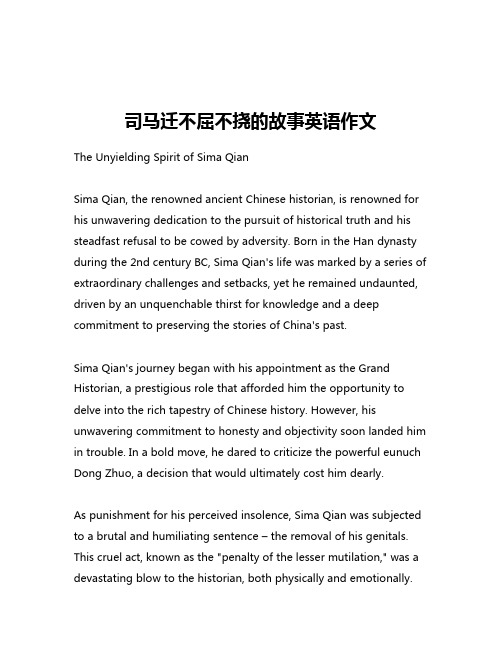
司马迁不屈不挠的故事英语作文The Unyielding Spirit of Sima QianSima Qian, the renowned ancient Chinese historian, is renowned for his unwavering dedication to the pursuit of historical truth and his steadfast refusal to be cowed by adversity. Born in the Han dynasty during the 2nd century BC, Sima Qian's life was marked by a series of extraordinary challenges and setbacks, yet he remained undaunted, driven by an unquenchable thirst for knowledge and a deep commitment to preserving the stories of China's past.Sima Qian's journey began with his appointment as the Grand Historian, a prestigious role that afforded him the opportunity to delve into the rich tapestry of Chinese history. However, his unwavering commitment to honesty and objectivity soon landed him in trouble. In a bold move, he dared to criticize the powerful eunuch Dong Zhuo, a decision that would ultimately cost him dearly.As punishment for his perceived insolence, Sima Qian was subjected to a brutal and humiliating sentence – the removal of his genitals. This cruel act, known as the "penalty of the lesser mutilation," was a devastating blow to the historian, both physically and emotionally.Yet, in the face of such adversity, Sima Qian's spirit remained unbroken.Rather than succumbing to despair or abandoning his life's work, Sima Qian channeled his pain and anguish into an even more profound dedication to his craft. He refused to allow his personal tragedy to overshadow the importance of his historical project, and with remarkable resilience, he continued his research and writing.Sima Qian's magnum opus, the Shiji (Records of the Grand Historian), stands as a testament to his unwavering determination. This monumental work, spanning 130 chapters and covering over 2,500 years of Chinese history, is a masterpiece of historiography that has endured the test of time. Through meticulous research, Sima Qian meticulously documented the rise and fall of dynasties, the exploits of legendary figures, and the ebb and flow of Chinese civilization.The Shiji is not merely a dry recitation of historical facts; it is a living, breathing narrative that captures the human drama and the complex interplay of power, ambition, and moral choices that have shaped the course of Chinese history. Sima Qian's writing is characterized by a keen eye for detail, a deep understanding of human nature, and a remarkable ability to weave together disparate strands of information into a cohesive and compelling whole.Despite the personal hardships he faced, Sima Qian remained steadfast in his commitment to the truth. He refused to succumb to the temptation of distorting or embellishing historical events to appease the powerful or to conform to prevailing political agendas. Instead, he strove to present a balanced and impartial account, recognizing the complexities and nuances of historical events.Sima Qian's unwavering dedication to historical accuracy and objectivity has earned him the respect and admiration of scholars and historians throughout the ages. His work has become an invaluable resource for understanding the rich tapestry of Chinese history, and his legacy continues to inspire and influence generations of researchers and writers.The story of Sima Qian's life is a testament to the power of the human spirit to overcome adversity and to pursue knowledge and truth with unwavering determination. His life serves as a shining example of the enduring value of intellectual honesty, the importance of preserving historical memory, and the transformative power of the written word.In the face of personal tragedy and political persecution, Sima Qian's unyielding spirit shines through, reminding us that even in the darkest of times, the pursuit of knowledge and the preservation of truth can be a powerful force for good. His legacy continues toinspire and guide us, encouraging us to strive for the same level of dedication, integrity, and courage that he embodied throughout his remarkable life.。
英语作文 黔驴技穷

英语作文黔驴技穷The Phrase "Qián lǘ jì qióng" (黔驴技穷) is a Chinese idiom that means "a donkey from Guizhou has exhausted all its skills". It is often used to describe a situation where someone has tried everything they know, but still can't solve a problem. In this essay, I will discuss the meaning of this idiom and its relevance in today's world.The origin of this idiom can be traced back to the Warring States period in China. According to legend, there was a donkey from Guizhou that was known for its exceptional skills. It could carry heavy loads, climb steep hills, and even cross rivers. However, one day, the donkey was faced with a task that was beyond its abilities. It had to cross a river that was too wide and deep. Despite its best efforts, the donkey could not find a way to cross the river. It had exhausted all its skills, and there was nothing more it could do.The story of the donkey from Guizhou has become a metaphor for situations where people face challenges that are beyond their abilities. It is a reminder that sometimes, no matter how skilled we are, there are limits to what we can do. It is also a reminder that we should not be afraidto ask for help when we need it.In today's world, the phrase "Qián lǘ jì qióng" is still relevant. We live in a complex and rapidly changing world, where problems can be difficult to solve. Technology has made our lives easier in many ways, but it has also created new challenges. For example, the rise of social media has led to new forms of cyberbullying and harassment. Many people are struggling to find ways to deal with these issues, and some may feel like they have exhausted alltheir options.In such situations, it is important to remember that we are not alone. There are always people who can help us, whether it is a friend, a family member, or a professional. It is also important to keep an open mind and be willing to try new approaches. Sometimes, the solution to a problemmay be something we have never considered before.In conclusion, the phras e "Qián lǘ jì qióng" is a powerful reminder that there are limits to what we can do, and that it is okay to ask for help when we need it. It is a reminder that we should not be afraid to try new approaches and seek out new solutions. By keeping this in mind, we can face the challenges of the modern world with confidence and resilience.。
2023全国甲卷英语作文优秀范文张骞

2023全国甲卷英语作文优秀范文张骞The first time I encountered the story of Zhang Qian was in a history textbook when I was in elementary school. His name was printed in bold characters, accompanied by a portrait depicting him as a man with a solemn expression and wearing traditional Han Chinese attire. Even as a young child, I could sense the weight of his legacy and the significance of his journeys.Zhang Qian was a diplomat and explorer who lived during the Han Dynasty, a pivotal period in Chinese history. In 138 BCE, he was commissioned by Emperor Wu to embark on an ambitious mission –to establish diplomatic and trade relations with the nomadic peoples of Central Asia and beyond. This was no small feat, as the vast expanse of the Eurasian steppe was largely uncharted territory for the Chinese at the time.Zhang Qian's journey was fraught with peril. He encountered hostile tribes, endured harsh climates, and faced capture and imprisonment. Yet, his resilience and determination never faltered. For over a decade, he traversed treacherous terrain, crossing deserts and scaling mountains, all in the pursuit of forging alliances and opening up new trade routes.One of Zhang Qian's most remarkable achievements was his role in establishing the Silk Road, a network of trade routes that connected China with the Roman Empire and other civilizations in the West. This ancient highway facilitated not only the exchange of goods but also the dissemination of ideas, knowledge, and cultural traditions across vast distances.Zhang Qian's journeys were not merely expeditions; they were voyages of discovery that reshaped the world as it was known to the Chinese. His reports provided invaluable insights into the lands, peoples, and customs beyond the borders of the Han Empire. His accounts of the powerful empires of Parthia and Bactria, and the exotic products they traded, kindled a fascination with the Western regions among the Chinese elite.Beyond his practical contributions, Zhang Qian's legacy lies in his embodiment of the indomitable human spirit. His unwavering determination in the face of adversity, his curiosity about the unknown, and his willingness to embrace new cultures and ideas set him apart as a true pioneer. He exemplified the values of courage, perseverance, and open-mindedness that have inspired generations of explorers and adventurers throughout history.As I reflect on Zhang Qian's story, I am struck by the profoundimpact that a single individual's actions can have on the course of human civilization. His journeys not only facilitated trade and cultural exchange but also laid the foundations for greater understanding and cooperation between disparate peoples. In an era where borders and divisions often dominate the headlines, Zhang Qian's legacy serves as a powerful reminder of the transformative potential of bridging gaps and fostering connections.Moreover, Zhang Qian's story resonates with the timeless human desire for knowledge and understanding. His thirst for exploration and discovery transcended the confines of his own era and culture, echoing the universal yearning to unravel the mysteries of the world around us. In that sense, his spirit lives on in the countless individuals who continue to push the boundaries of human knowledge and understanding, driven by an insatiable curiosity and a commitment to expanding the frontiers of human experience.As I pen these words, I am filled with a profound sense of admiration and gratitude for Zhang Qian's remarkable life and achievements. His story reminds us that even in the face of daunting challenges, the human spirit can triumph, and that the pursuit of knowledge and understanding can forge enduring connections across vast divides. In a world that often seems fragmented and divisive, Zhang Qian's legacy stands as a beacon of hope, reminding us of thetransformative power of curiosity, perseverance, and a willingness to embrace the unknown.。
高考英语作文张骞
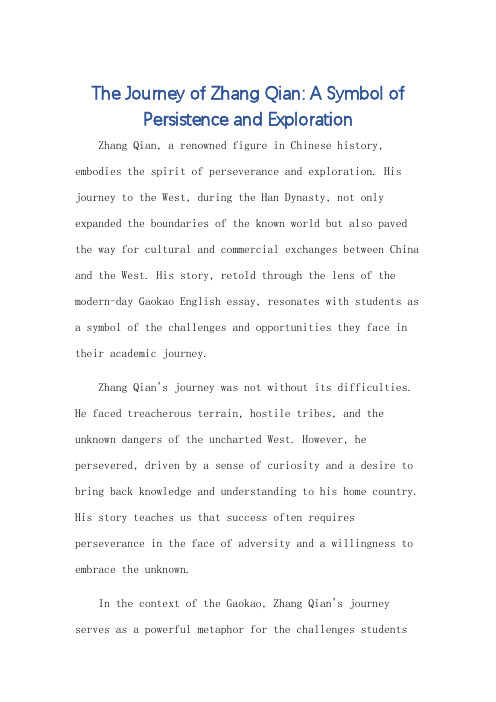
The Journey of Zhang Qian: A Symbol of Persistence and ExplorationZhang Qian, a renowned figure in Chinese history, embodies the spirit of perseverance and exploration. His journey to the West, during the Han Dynasty, not only expanded the boundaries of the known world but also paved the way for cultural and commercial exchanges between China and the West. His story, retold through the lens of the modern-day Gaokao English essay, resonates with students as a symbol of the challenges and opportunities they face in their academic journey.Zhang Qian's journey was not without its difficulties. He faced treacherous terrain, hostile tribes, and the unknown dangers of the uncharted West. However, he persevered, driven by a sense of curiosity and a desire to bring back knowledge and understanding to his home country. His story teaches us that success often requires perseverance in the face of adversity and a willingness to embrace the unknown.In the context of the Gaokao, Zhang Qian's journey serves as a powerful metaphor for the challenges studentsface. The Gaokao, often referred to as the "Chinese College Entrance Exam," is a critical milestone in the academic careers of Chinese students. It represents a testing ground not only for academic knowledge but also for perseverance, resilience, and the ability to adapt to pressure.Just as Zhang Qian persevered in his journey to the West, students must persevere in their studies, despite the difficulties and pressures they may encounter. They must maintain a sense of curiosity and a desire to learn, just as Zhang Qian did in his quest for knowledge. By doing so, they can overcome the challenges of the Gaokao and embark on their own journey of discovery and growth.Zhang Qian's story also teaches us about the importance of cultural exchange and understanding. His journey to the West not only brought back valuable information about foreign lands but also fostered cultural exchanges between China and the West. Similarly, in the modern era, students must cultivate a global perspective and an appreciation for diverse cultures. By doing so, they can contribute to the global community and promote understanding and harmony among nations.In conclusion, the story of Zhang Qian serves as a powerful inspiration for students facing the challenges of the Gaokao. His perseverance, curiosity, and willingness to embrace the unknown are qualities that students can draw upon in their own academic journey. By embracing these qualities, students can overcome the difficulties of the Gaokao and embark on a journey of discovery and growth that will prepare them for the challenges and opportunities of the future.**张骞的旅程:坚持与探索的象征**张骞,这位在中国历史上赫赫有名的人物,体现了坚持与探索的精神。
司马迁挫折英语作文

司马迁挫折英语作文Title: Overcoming Adversity: The Story of Sima Qian。
Sima Qian, also known as Ssu-ma Ch'ien, was a Chinese historian who lived during the Han dynasty. His lifejourney is marked by numerous setbacks and challenges, yet he emerged as one of the most influential figures in Chinese historiography. Let's delve into the trials and triumphs of Sima Qian's life and explore the valuable lessons we can learn from his experiences.Sima Qian faced his first major setback when his father, Sima Tan, a renowned historian, was implicated in apolitical scandal and subsequently executed. Despite this devastating blow, Sima Qian was determined to carry on his father's legacy and uphold the family's reputation. He immersed himself in the study of history and literature, displaying a remarkable resilience in the face of adversity.However, Sima Qian's challenges were far from over. Asa court historian, he incurred the wrath of Emperor Han Wudi for his defense of General Li Ling, who had suffered a defeat in battle. As punishment, Sima Qian was subjected to castration, a cruel and humiliating punishment in ancient China. This physical and emotional ordeal could have easily broken a lesser man, but Sima Qian remained steadfast in his dedication to his craft.Despite his castration, Sima Qian continued his work as a historian with unwavering determination. He embarked on a monumental task – the writing of the "Records of the Grand Historian" (Shiji), a comprehensive history of China from legendary times to the reign of Emperor Han Wudi. This ambitious project spanned decades and required meticulous research and writing, yet Sima Qian persevered, driven by his passion for history and his desire to leave behind a lasting legacy.Throughout his life, Sima Qian faced numerous obstacles – political persecution, personal tragedy, and physical suffering – yet he never wavered in his commitment to his principles. His resilience in the face of adversity servesas an inspiration to us all.From Sima Qian's story, we can glean several important lessons. Firstly, resilience and perseverance are essential qualities in the face of adversity. Despite facing seemingly insurmountable challenges, Sima Qian never gave up on his goals. Instead, he adapted to his circumstances and found ways to overcome obstacles.Secondly, Sima Qian's unwavering dedication to hiscraft highlights the importance of passion and purpose in life. Despite the personal risks and sacrifices involved, he remained committed to his work as a historian, driven by his love for history and his desire to preserve the truth for future generations.Finally, Sima Qian's story reminds us of the power of forgiveness and redemption. Despite being subjected to harsh punishment by Emperor Han Wudi, Sima Qian chose to forgive his oppressors and focus on his work. In doing so, he was able to transcend his circumstances and leave behind a lasting legacy that continues to inspire generations ofhistorians and scholars.In conclusion, Sima Qian's life is a testament to the human spirit's capacity to overcome adversity and achieve greatness. His story serves as a timeless reminder of the importance of resilience, passion, and forgiveness in the pursuit of our dreams. As we face our own challenges in life, let us draw inspiration from Sima Qian's example and strive to emulate his courage and determination.。
sclg英语作文
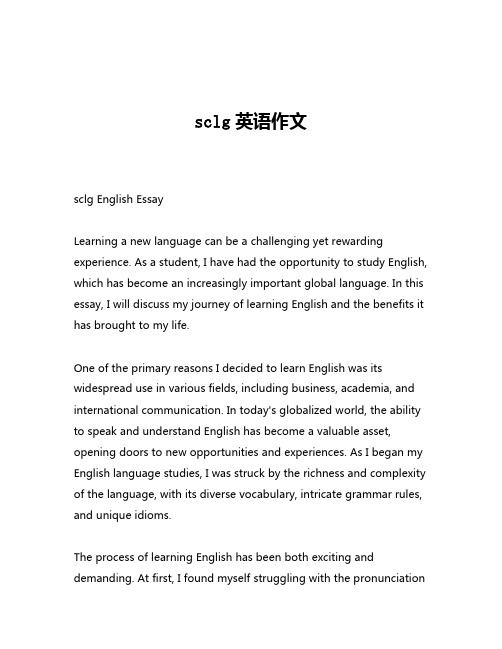
sclg英语作文sclg English EssayLearning a new language can be a challenging yet rewarding experience. As a student, I have had the opportunity to study English, which has become an increasingly important global language. In this essay, I will discuss my journey of learning English and the benefits it has brought to my life.One of the primary reasons I decided to learn English was its widespread use in various fields, including business, academia, and international communication. In today's globalized world, the ability to speak and understand English has become a valuable asset, opening doors to new opportunities and experiences. As I began my English language studies, I was struck by the richness and complexity of the language, with its diverse vocabulary, intricate grammar rules, and unique idioms.The process of learning English has been both exciting and demanding. At first, I found myself struggling with the pronunciationof certain words, the conjugation of verbs, and the nuances of sentence structure. However, with consistent practice, dedication, and a willingness to learn, I gradually began to improve my language skills. Attending English classes, engaging in conversations with native speakers, and immersing myself in English-language media have all been instrumental in my progress.One of the most rewarding aspects of learning English has been the opportunity to connect with people from diverse cultural backgrounds. As I have become more proficient in the language, I have been able to engage in meaningful dialogues with individuals from around the world, exchanging ideas, perspectives, and experiences. This has not only broadened my understanding of different cultures but has also helped me develop greater empathy and respect for the diversity of our global community.Moreover, the ability to communicate in English has opened up a wealth of educational and professional opportunities for me. I have been able to access a vast array of resources, from academic journals and textbooks to online learning platforms and international conferences, all of which have contributed to my intellectual growth and personal development. Additionally, the proficiency in English has made me a more competitive candidate in the job market, as many employers value the ability to communicate effectively in this global language.Beyond the practical benefits, learning English has also had a profound impact on my personal growth. The process of mastering a new language has challenged me to step outside of my comfort zone, to be more adaptable and resilient in the face of challenges, and to develop a greater appreciation for cultural diversity. The sense of accomplishment I feel when I am able to express myself fluently in English is truly empowering, and it has instilled in me a deep senseof pride and self-confidence.As I continue on my journey of learning English, I am constantly reminded of the importance of perseverance, curiosity, and a willingness to take risks. There have been times when the challenges seemed overwhelming, but I have learned to embrace the process of learning and to view setbacks as opportunities for growth and improvement. By maintaining a positive attitude and a commitment to continuous learning, I am confident that I will continue to make progress in my English language skills.In conclusion, my experience of learning English has been a transformative one. It has not only equipped me with a valuable skill but has also enriched my personal and intellectual life in countless ways. As I look to the future, I am excited to continue exploring the depths of the English language and to use my linguistic abilities to connect with people from around the world, to pursue new academicand professional opportunities, and to contribute to the global community in meaningful ways. The journey of learning English has been challenging, but the rewards have been immeasurable, and I am grateful for the opportunity to embark on this rewarding and life-changing experience.。
濉溪县期中英语作文

濉溪县期中英语作文Suixi County is a county located in the eastern part of Anhui Province in China. It is known for its rich history, beautiful natural scenery, and thriving economy. As a student living in Suixi County, I have had the opportunity to experience the unique culture and development of this region firsthand.One of the most striking features of Suixi County is its natural beauty. The county is home to a number of scenic spots, including the Huangshan Mountain Range, which is renowned for its stunning peaks, ancient pine trees, and breathtaking views. The Yangtze River also runs through the county, providing a serene and picturesque backdrop to the surrounding landscape. In addition to these natural wonders, Suixi County is also home to a number of historic sites and cultural landmarks, such as the ancient Taoist temple of Tianzhu and the well-preserved Ming Dynasty-era architecture in the town of Chaohu.Despite its rich cultural heritage, Suixi County is also a rapidly developing region with a thriving economy. The county is known forits production of high-quality agricultural products, including rice, tea, and fruits, which are exported to markets both within China and around the world. In recent years, the county has also seen significant investment in industries such as manufacturing, technology, and tourism, which have helped to drive economic growth and create new job opportunities for local residents.One of the key factors behind Suixi County's economic success is its strategic location. The county is situated along major transportation routes, including highways and railways, which have facilitated the movement of goods and people in and out of the region. This has helped to attract businesses and investors, who have recognized the county's potential as a hub for trade and commerce.Another important aspect of Suixi County's development is its commitment to sustainable and eco-friendly practices. The county has made significant investments in renewable energy sources, such as solar and wind power, and has also implemented a range of environmental protection measures to preserve the natural landscape and reduce its carbon footprint. This focus on sustainability has not only helped to improve the county's environmental profile, but has also attracted a growing number of eco-tourists and investors who are drawn to the region's commitment to sustainable development.Despite the many successes that Suixi County has achieved, the county also faces a number of challenges that it must address in order to continue its growth and development. One of the key challenges is the need to address the growing income inequality within the county, as some residents have benefited more from the economic boom than others. The county has also faced challenges in terms of infrastructure development, with some areas still lacking access to reliable transportation, healthcare, and other essential services.To address these challenges, the local government has implemented a range of policies and initiatives aimed at promoting more inclusive and equitable development. This includes investments in education, healthcare, and social welfare programs, as well as efforts to attract new businesses and industries to the region. The county has also worked to strengthen its partnerships with neighboring regions and to participate in broader regional development initiatives, in order to leverage its strategic location and capitalize on new economic opportunities.Overall, Suixi County is a fascinating and dynamic region that offers a unique blend of natural beauty, cultural heritage, and economic development. As a student living in the county, I have been inspired by the resilience and innovation of the local community, and I am excited to see what the future holds for this remarkable region.Whether it is exploring the stunning natural landscapes, immersing myself in the rich cultural traditions, or contributing to the county's ongoing economic and social progress, Suixi County has provided me with a wealth of opportunities to grow and learn.。
解释一位中国古代历史任务张褰英文作文
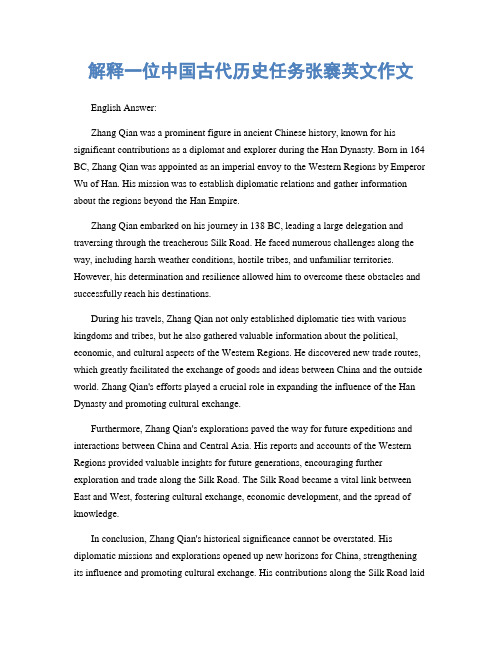
解释一位中国古代历史任务张褰英文作文English Answer:Zhang Qian was a prominent figure in ancient Chinese history, known for his significant contributions as a diplomat and explorer during the Han Dynasty. Born in 164 BC, Zhang Qian was appointed as an imperial envoy to the Western Regions by Emperor Wu of Han. His mission was to establish diplomatic relations and gather information about the regions beyond the Han Empire.Zhang Qian embarked on his journey in 138 BC, leading a large delegation and traversing through the treacherous Silk Road. He faced numerous challenges along the way, including harsh weather conditions, hostile tribes, and unfamiliar territories. However, his determination and resilience allowed him to overcome these obstacles and successfully reach his destinations.During his travels, Zhang Qian not only established diplomatic ties with various kingdoms and tribes, but he also gathered valuable information about the political, economic, and cultural aspects of the Western Regions. He discovered new trade routes, which greatly facilitated the exchange of goods and ideas between China and the outside world. Zhang Qian's efforts played a crucial role in expanding the influence of the Han Dynasty and promoting cultural exchange.Furthermore, Zhang Qian's explorations paved the way for future expeditions and interactions between China and Central Asia. His reports and accounts of the Western Regions provided valuable insights for future generations, encouraging further exploration and trade along the Silk Road. The Silk Road became a vital link between East and West, fostering cultural exchange, economic development, and the spread of knowledge.In conclusion, Zhang Qian's historical significance cannot be overstated. His diplomatic missions and explorations opened up new horizons for China, strengthening its influence and promoting cultural exchange. His contributions along the Silk Road laidthe foundation for centuries of trade and cultural interactions between China and the Western Regions. Zhang Qian's legacy continues to inspire and remind us of the importance of exploration, diplomacy, and cultural exchange in shaping the course of history.中文回答:张骞是中国古代历史上的重要人物,被誉为汉代的一位外交家和探险家。
四川专升本英语作文范文

四川专升本英语作文范文Embark on a journey through the picturesque landscapes of Sichuan, where the pursuit of academic excellence meets the vibrant culture of China. As the sun sets over the majestic peaks of the Himalayas, a new dawn of opportunity arises for students in Sichuan Province, eager to elevate their educational status through the "Zhuan Sheng Ben" or the "Special Plan for Undergraduate Education for College Students". This initiative, a beacon of hope for many, has become the talk of the town, igniting a spark of ambition in the hearts of aspiring scholars.The "Zhuan Sheng Ben" is not merely a program; it is a transformative experience that opens doors to a world of knowledge and professional growth. It is a testament to the relentless pursuit of education, a pathway that leads to the summit of academic achievement. For those who have yearned to climb the ladder of success, this program is the stepping stone that propels them towards their dreams.In the heart of Sichuan, where the spicy fragrance of Sichuan cuisine fills the air, the fervor for learning is equally potent. Students, once confined to the boundaries of their current qualifications, now find themselves at the crossroads of possibility. The English composition, acritical component of the "Zhuan Sheng Ben", is not just an assessment; it's a narrative of one's journey, a reflection of one's aspirations, and a window into one's soul.The composition is a canvas where students paint their future with words, where they articulate their understanding of the world, and where they express their vision for tomorrow. It is through this medium that they demonstrate not only their linguistic prowess but also their criticalthinking and creativity. The essays penned under the "Zhuan Sheng Ben" are a mosaic of ideas, a tapestry woven with threads of ambition and determination.As the program continues to flourish, so does the spirit of its participants. The "Zhuan Sheng Ben" is more than a gateway to higher education; it's a symbol of resilience, a celebration of diversity, and a catalyst for change. It stands as a proud monument to the unyielding spirit of Sichuan's students, who, with every essay, every exam, and every step forward, are writing their own stories of triumph.。
解释一位中国古代历史任务张褰英文作文
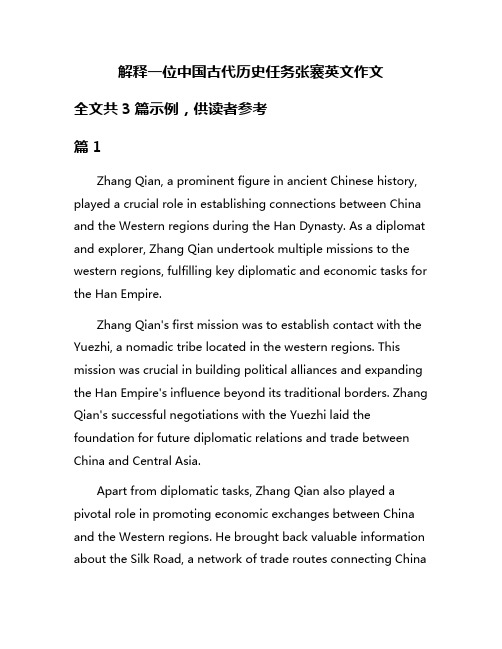
解释一位中国古代历史任务张褰英文作文全文共3篇示例,供读者参考篇1Zhang Qian, a prominent figure in ancient Chinese history, played a crucial role in establishing connections between China and the Western regions during the Han Dynasty. As a diplomat and explorer, Zhang Qian undertook multiple missions to the western regions, fulfilling key diplomatic and economic tasks for the Han Empire.Zhang Qian's first mission was to establish contact with the Yuezhi, a nomadic tribe located in the western regions. This mission was crucial in building political alliances and expanding the Han Empire's influence beyond its traditional borders. Zhang Qian's successful negotiations with the Yuezhi laid the foundation for future diplomatic relations and trade between China and Central Asia.Apart from diplomatic tasks, Zhang Qian also played a pivotal role in promoting economic exchanges between China and the Western regions. He brought back valuable information about the Silk Road, a network of trade routes connecting Chinawith Central Asia and the Mediterranean. Zhang Qian's reports on the lucrative trade opportunities along the Silk Road encouraged the Han government to invest in trading caravans and infrastructure development, leading to increased trade and cultural exchanges between East and West.Moreover, Zhang Qian's explorations into the Western regions helped the Han Empire acquire strategic military intelligence. He discovered the presence of powerful nomadic tribes such as the Xiongnu, who posed a significant threat to the Han Empire's northern borders. Zhang Qian's reports on the military strength and movements of the Xiongnu enabled the Han government to devise effective defense strategies and launch military campaigns to secure its frontiers.In conclusion, Zhang Qian's historical missions were instrumental in advancing the Han Empire's diplomatic, economic, and military interests in the Western regions. His efforts not only established cultural exchanges and diplomatic alliances but also opened up new trade routes that facilitated the flow of goods, ideas, and technologies between China and the West. Zhang Qian's legacy as a pioneering diplomat and explorer continues to inspire future generations to explore new frontiersand build bridges of cooperation and understanding across different civilizations.篇2Zhang Qian was a famous Chinese historical figure from the Han Dynasty. He was a diplomat and explorer who played a crucial role in opening up the Silk Road, which connected China with the rest of the world. Zhang Qian was tasked with a mission by Emperor Wu of the Han Dynasty to establish diplomatic relations with the Yuezhi people in Central Asia to form an alliance against the Xiongnu, a nomadic tribe that posed a threat to the Han Dynasty.Zhang Qian's journey was not an easy one. He faced many challenges and hardships along the way, including being captured by the Xiongnu and held captive for over 10 years. However, he never gave up on his mission and eventually made it to the Yuezhi people, where he successfully negotiated an alliance with them. This alliance helped weaken the Xiongnu and secure the northern borders of the Han Dynasty.In addition to his diplomatic achievements, Zhang Qian's travels also had a significant impact on the exchange of goods, ideas, and cultures between China and the Western regions. Hisexploration of the Silk Road paved the way for the Silk Road trade network, which facilitated the spread of silk, spices, and other goods between China, Central Asia, and the Mediterranean region.Overall, Zhang Qian's role in opening up the Silk Road and establishing diplomatic relations with the Yuezhi people was crucial in shaping the history of ancient China and the world. His bravery, perseverance, and diplomatic skills have made him a legendary figure in Chinese history, and his legacy continues to inspire generations of Chinese people to this day.篇3Zhang Qian was an eminent figure in ancient Chinese history who played a crucial role in developing diplomatic relations and fostering trade networks during the Han dynasty. Born in the 2nd century BC in the Western Han Dynasty, Zhang Qian embarked on two significant missions to Central Asia, thereby establishing the famous Silk Road trade route that connected China to the Western world. Zhang Qian’s endeavors had a profoun d impact on Chinese history, as they facilitated cultural exchange, economic prosperity, and political stability.Zhang Qian’s first mission was initiated by Emperor Wu of Han to establish alliances with the distant Yuezhi tribe, who had been driven out of China by the Xiongnu nomads. Despite facing numerous challenges, including capture and imprisonment by the Xiongnu, Zhang Qian persevered and eventually reached the Yuezhi territory. His successful negotiation with the Yuezhi not only secured an alliance against the common enemy, the Xiongnu, but also paved the way for future trade relations with Central Asia. Zhang Qian’s detailed accounts of the Western regions, known as the “Records of the Great Historian,” provided valuable information about the geography, customs, and resources of the various kingdoms along his journey.In his second mission, Zhang Qian was tasked with establishing trade routes and fostering cultural exchange between China and the Western regions. He traveled as far as the Parthian Empire (modern-day Iran) and established commercial ties with the various kingdoms along the way. Zhang Qian’s diplomatic efforts laid the foundation for the Silk Road trade network, which facilitated the exchange of goods, ideas, and technologies between China, Persia, Rome, and other civilizations. The introduction of new commodities such as silk, tea, and paper to the West, as well as the adoption of horses,grapes, and walnuts in China, enhanced economic prosperity and cultural diversity in both regions.Zhang Qian’s missions not only promoted commerce and cultural exchange but also had significant political implications. By establishing alliances and trade relations with the Western regions, Zhang Qian helped weaken the Xiongnu threat and stabi lize the Han dynasty’s northern borders. His diplomatic efforts contributed to the expansion of Chinese influence in Central Asia and laid the groundwork for the subsequent Han conquests and establishment of the Western regions as protectorates of the empi re. Zhang Qian’s pioneering efforts in diplomacy and trade set a precedent for future generations of Chinese diplomats and merchants to engage with neighboring civilizations and promote cross-cultural understanding.In conclusion, Zhang Qian’s missions to Central Asia were instrumental in advancing Chinese interests and promoting international cooperation during the Han dynasty. His contributions to the development of the Silk Road trade route, diplomatic relations with the Western regions, and cultural exchange between China and other civilizations have left a lasting legacy in Chinese history. Zhang Qian’s courage, resilience, and foresight have earned him a revered place in theannals of Chinese antiquity as a visionary diplomat and trailblazer of cross-border interactions.。
英语作文按图索骥150词
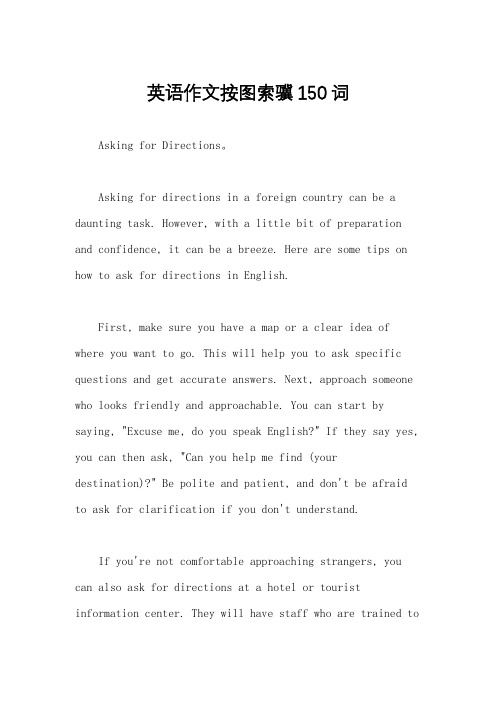
英语作文按图索骥150词Asking for Directions。
Asking for directions in a foreign country can be a daunting task. However, with a little bit of preparation and confidence, it can be a breeze. Here are some tips on how to ask for directions in English.First, make sure you have a map or a clear idea of where you want to go. This will help you to ask specific questions and get accurate answers. Next, approach someone who looks friendly and approachable. You can start by saying, "Excuse me, do you speak English?" If they say yes, you can then ask, "Can you help me find (your destination)?" Be polite and patient, and don't be afraid to ask for clarification if you don't understand.If you're not comfortable approaching strangers, you can also ask for directions at a hotel or tourist information center. They will have staff who are trained tohelp tourists and can give you detailed instructions on how to get to your destination.Remember, asking for directions is a normal part of traveling, and most people are happy to help. Just be prepared, confident, and polite, and you'll be on your way in no time.。
小毕考作文
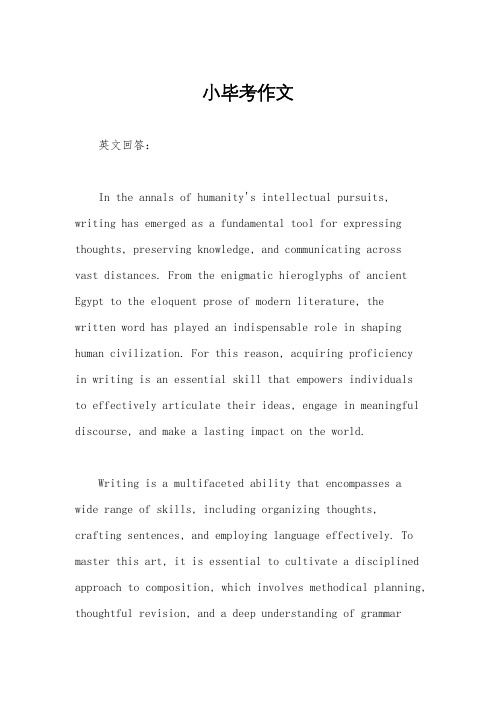
小毕考作文英文回答:In the annals of humanity's intellectual pursuits, writing has emerged as a fundamental tool for expressing thoughts, preserving knowledge, and communicating across vast distances. From the enigmatic hieroglyphs of ancient Egypt to the eloquent prose of modern literature, thewritten word has played an indispensable role in shaping human civilization. For this reason, acquiring proficiencyin writing is an essential skill that empowers individualsto effectively articulate their ideas, engage in meaningful discourse, and make a lasting impact on the world.Writing is a multifaceted ability that encompasses a wide range of skills, including organizing thoughts,crafting sentences, and employing language effectively. To master this art, it is essential to cultivate a disciplined approach to composition, which involves methodical planning, thoughtful revision, and a deep understanding of grammarand syntax. Additionally, immersion in quality literature, both classic and contemporary, is crucial for developing an appreciation for well-written language and learning from the masters of the craft.Beyond its practical utility, writing also fosters cognitive development and critical thinking skills. As individuals engage in the process of writing, they are forced to organize their thoughts, analyze complex issues, and consider multiple perspectives. This exercise strengthens the mind and cultivates a capacity for logical reasoning and informed judgment. Furthermore, writing promotes self-reflection and personal growth by allowing individuals to externalize their thoughts and emotions, thereby gaining a deeper understanding of themselves and their place in the world.In the digital age, where information and communication technologies are ubiquitous, writing has become more important than ever. Through social media platforms, email, and instant messaging services, individuals constantly engage in written communication. The ability to expressoneself clearly and effectively in these mediums isessential for professional success, social engagement, and personal fulfillment.In conclusion, the mastery of writing is an indispensable skill that empowers individuals to express their thoughts, engage in meaningful discourse, and make a lasting impact on the world. It fosters cognitive development, critical thinking skills, and personal growth. In an increasingly interconnected and technology-driven world, the ability to write effectively is more important than ever.中文回答:在人类智力追求的历史中,写作已经成为表达思想、保存知识和跨越遥远距离进行交流的基本工具。
submision四级考试作文
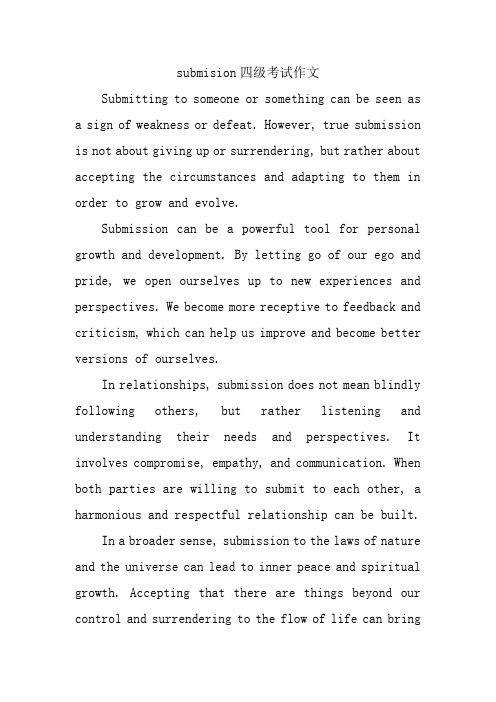
submision四级考试作文Submitting to someone or something can be seen as a sign of weakness or defeat. However, true submission is not about giving up or surrendering, but rather about accepting the circumstances and adapting to them in order to grow and evolve.Submission can be a powerful tool for personal growth and development. By letting go of our ego and pride, we open ourselves up to new experiences and perspectives. We become more receptive to feedback and criticism, which can help us improve and become better versions of ourselves.In relationships, submission does not mean blindly following others, but rather listening and understanding their needs and perspectives. It involves compromise, empathy, and communication. When both parties are willing to submit to each other, a harmonious and respectful relationship can be built.In a broader sense, submission to the laws of nature and the universe can lead to inner peace and spiritual growth. Accepting that there are things beyond our control and surrendering to the flow of life can bringa sense of liberation and freedom.Ultimately, submission is not a sign of weakness, but a demonstration of strength and wisdom. It requires humility, self-awareness, and a willingness to learn and grow. By embracing submission in its truest form, we can navigate life's challenges with grace and resilience.中文翻译:向某人或某事屈服可能被视为软弱或失败的表现。
思平桥作文
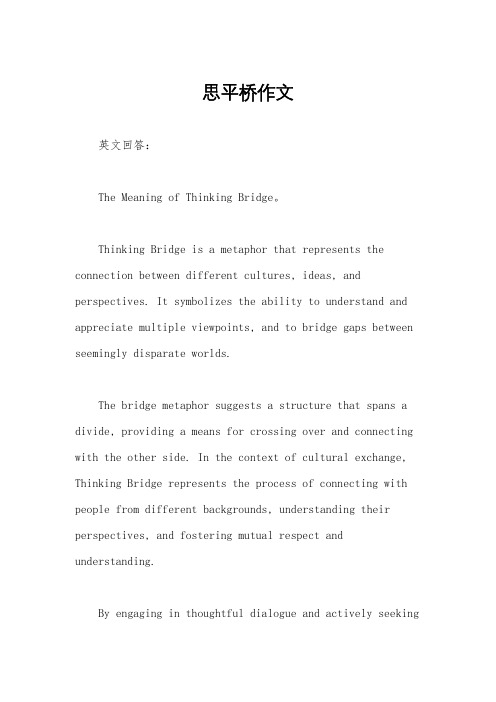
思平桥作文英文回答:The Meaning of Thinking Bridge。
Thinking Bridge is a metaphor that represents the connection between different cultures, ideas, and perspectives. It symbolizes the ability to understand and appreciate multiple viewpoints, and to bridge gaps between seemingly disparate worlds.The bridge metaphor suggests a structure that spans a divide, providing a means for crossing over and connecting with the other side. In the context of cultural exchange, Thinking Bridge represents the process of connecting with people from different backgrounds, understanding their perspectives, and fostering mutual respect and understanding.By engaging in thoughtful dialogue and actively seekingout diverse perspectives, individuals can build Thinking Bridges that break down barriers and create a moreinclusive and interconnected world. These bridges allow for the exchange of knowledge, ideas, and values, fostering a sense of global community and empathy.The Importance of Thinking Bridge。
2021年小升初考试英语作文
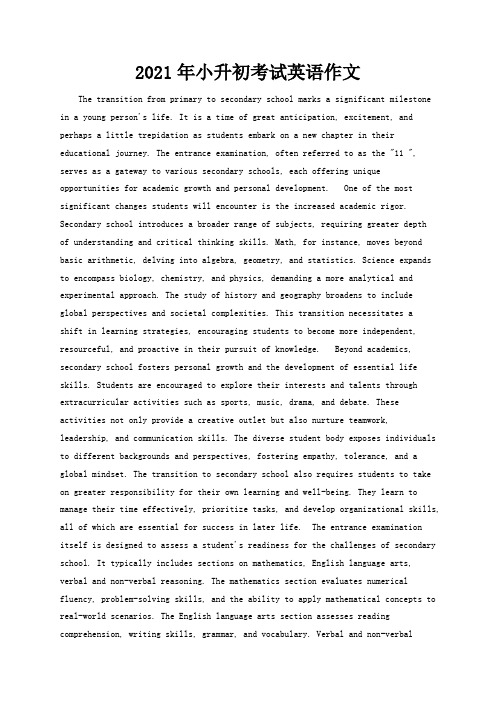
2021年小升初考试英语作文The transition from primary to secondary school marks a significant milestonein a young person's life. It is a time of great anticipation, excitement, and perhaps a little trepidation as students embark on a new chapter in their educational journey. The entrance examination, often referred to as the "11 ", serves as a gateway to various secondary schools, each offering uniqueopportunities for academic growth and personal development. One of the most significant changes students will encounter is the increased academic rigor. Secondary school introduces a broader range of subjects, requiring greater depthof understanding and critical thinking skills. Math, for instance, moves beyond basic arithmetic, delving into algebra, geometry, and statistics. Science expands to encompass biology, chemistry, and physics, demanding a more analytical and experimental approach. The study of history and geography broadens to include global perspectives and societal complexities. This transition necessitates ashift in learning strategies, encouraging students to become more independent, resourceful, and proactive in their pursuit of knowledge. Beyond academics, secondary school fosters personal growth and the development of essential life skills. Students are encouraged to explore their interests and talents through extracurricular activities such as sports, music, drama, and debate. Theseactivities not only provide a creative outlet but also nurture teamwork, leadership, and communication skills. The diverse student body exposes individuals to different backgrounds and perspectives, fostering empathy, tolerance, and a global mindset. The transition to secondary school also requires students to take on greater responsibility for their own learning and well-being. They learn to manage their time effectively, prioritize tasks, and develop organizational skills, all of which are essential for success in later life. The entrance examination itself is designed to assess a student's readiness for the challenges of secondary school. It typically includes sections on mathematics, English language arts, verbal and non-verbal reasoning. The mathematics section evaluates numerical fluency, problem-solving skills, and the ability to apply mathematical concepts to real-world scenarios. The English language arts section assesses reading comprehension, writing skills, grammar, and vocabulary. Verbal and non-verbalreasoning sections gauge critical thinking, logical deduction, and spatial awareness. Preparation for the entrance examination is crucial for students to demonstrate their full potential. Regular practice with past papers and mock tests can familiarize students with the format and types of questions they might encounter. It is equally important to focus on developing strong foundational skills in mathematics and English. Reading widely, engaging in stimulating conversations, and practicing writing in different styles can all contribute to improved language proficiency. Similarly, working through challenging math problems and seeking clarification on difficult concepts can enhance mathematical fluency and problem-solving abilities. The transition to secondary school is a significant step towards realizing one's full potential. It offers a wealth of opportunities for academic, personal, and social growth. By embracing the challenges and embracing the opportunities that lie ahead, students can embark on a fulfilling and enriching educational journey that will shape their future. The entrance examination, while demanding, serves as a valuable stepping stone towards achieving their academic aspirations and unlocking a world of possibilities.。
荀子英语作文
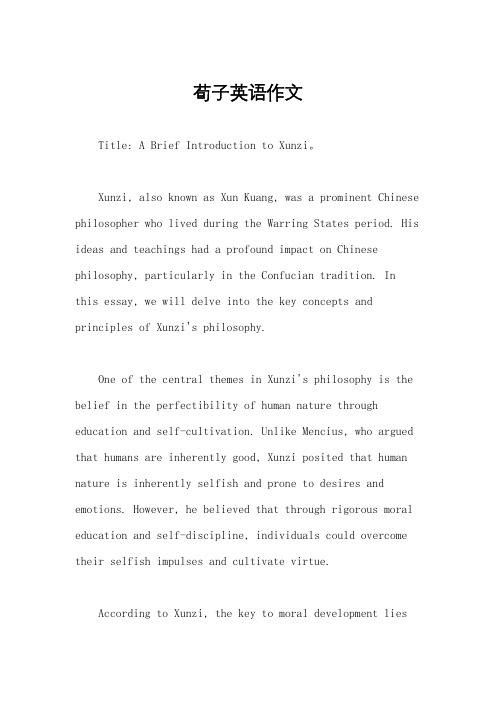
荀子英语作文Title: A Brief Introduction to Xunzi。
Xunzi, also known as Xun Kuang, was a prominent Chinese philosopher who lived during the Warring States period. His ideas and teachings had a profound impact on Chinese philosophy, particularly in the Confucian tradition. Inthis essay, we will delve into the key concepts and principles of Xunzi's philosophy.One of the central themes in Xunzi's philosophy is the belief in the perfectibility of human nature through education and self-cultivation. Unlike Mencius, who argued that humans are inherently good, Xunzi posited that human nature is inherently selfish and prone to desires and emotions. However, he believed that through rigorous moral education and self-discipline, individuals could overcome their selfish impulses and cultivate virtue.According to Xunzi, the key to moral development liesin the cultivation of ritual propriety (li) and the observance of social norms and conventions. He emphasized the importance of ritual and ceremony as a means of instilling discipline and order in society. Through the practice of ritual, individuals learn to regulate their behavior and cultivate a sense of propriety and decorum.Furthermore, Xunzi stressed the importance of ethical governance and the role of the ruler in promoting social harmony and stability. He believed that a virtuous ruler should lead by example and govern with benevolence and justice. By upholding moral principles and setting a good example for their subjects, rulers could inspire the people to cultivate virtue and contribute to the overall well-being of society.In addition to his emphasis on moral education and ethical governance, Xunzi also made significant contributions to the development of Chinese cosmology and metaphysics. He proposed a holistic view of the universe, in which human beings are seen as an integral part of the natural order. According to Xunzi, the universe operatesaccording to the principles of dao (the Way) and qi (vital energy), and human beings must align themselves with these cosmic forces in order to achieve harmony and balance.Overall, Xunzi's philosophy represents a unique blendof Confucian ethics, political theory, and metaphysical speculation. His emphasis on the perfectibility of human nature through education and self-cultivation continues to resonate in contemporary discussions of ethics and morality. By studying Xunzi's ideas, we can gain valuable insightsinto the complexities of human nature and the quest for moral perfection.。
- 1、下载文档前请自行甄别文档内容的完整性,平台不提供额外的编辑、内容补充、找答案等附加服务。
- 2、"仅部分预览"的文档,不可在线预览部分如存在完整性等问题,可反馈申请退款(可完整预览的文档不适用该条件!)。
- 3、如文档侵犯您的权益,请联系客服反馈,我们会尽快为您处理(人工客服工作时间:9:00-18:30)。
Book - I lifelong friends
Gorky said: "the book is the ladder of human progress." To this, I deeply impressed that. I also like reading, and in every age group will see many different kinds of books. Just as the golgi said "ladder", different stage see of book, for me now is the formation of the rich knowledge of contribution.
I see the beginning of the book is known as "WaWaShu" little picture album, which although some scientific knowledge, but gradually, it can't satisfy my desire for knowledge. Then and mom bought me a lot of popular science books, such as "hundred thousand whys", "five thousand years or" and so on, I see more with relish, some knowledge can also carry out! Later, my mother bought me the ShenShiXi animal stories ", in the novel the story of the animals and people, often make me be very worried about. Recently, my mother gave me to buy the terrible math "series, for I open a door for magic of mathematical gate.
Each book for helping me also is different. Literature books, such as the book old story of south and the ShenShiXi animal stories "and so on, the story in the book appetizing for my cup of tea, I was attracted to the protagonist's vicissitudes of life, sometimes cheerful, sometimes sad, let me know how the man's beauty and ugliness good and evil. And popular science books is like a teacher to me as to impart knowledge, such as "terrible math" and "the earth's story, they let me to have a further understanding of scientific knowledge, help me to become king of knowledge. Of course there are pictures, such as "chongqing scenery", let I don't have to chongqing through mountains and rivers, you can make the beauty of the chongqing panoramic view.
People often say: "reading enriches the mind!" A book is the human life friends, but also human nourishment for the mind. Therefore, we should be like bing xin old man said that: "good reading, read more books, read good books.。
